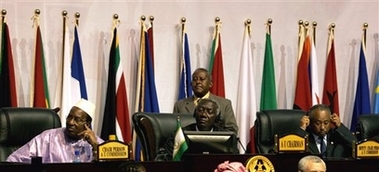AU summit opens with debates on Darfur
(AP)Updated: 2007-07-02 09:57
ACCRA, Ghana - Plans to deploy a joint UN-African Union peacekeeping force to Sudan's violence-plagued Darfur region could still be derailed by a dearth in funding and political will, the chairman of the African Union warned Sunday.
 African Union leaders listen to a speech during the opening ceremony of the AU summit in Accra, Ghana Sunday, July 1, 2007. [AP]  |
The main official topic of debate at the three-day summit is a long-discussed, but elusive idea for a pan-African government, but crises in Sudan and Zimbabwe are also expected to get attention.
Konare acknowledged that Sudan had, after much negotiation, accepted plans for a joint peacekeeping force, but he questioned the Sudanese government's commitment to peace.
"It is also important that Sudan end the bombardments," Konare said, referring to the government's four-year battle with rebels in Darfur.
The proposed 23,000-strong UN-AU hybrid force is aimed at bolstering the beleaguered 7,000-strong AU force now in Darfur.
Sudan's president, who canceled his trip to the summit after the death of an adviser, held a teleconference from Khartoum late Saturday in which he charged that Western governments were intervening in Darfur out of self-serving motives. "Some of them are only involved because of what they will gain from the resources of the people," Omar al-Bashir said.
Deputy UN Secretary-General Asha-Rose Migiro commended the AU for addressing the Darfur crisis when no one else would, but said African states alone lack resources to end the conflict. She told those at the opening session they should "urgently proceed" with the hybrid force.
Britain and Ghana, which currently holds the rotating AU presidency, are introducing a resolution to the UN Security Council to authorize the joint UN-AU force.
Ghanaian authorities banned protests until the final day of the summit on Tuesday, and 2,000 police fanned out across this West African capital to enforce the mandate. Planned demonstrations include one by Zimbabwean activists decrying the crackdown on dissidents in their country.
On the sidelines of the summit, South African President Thabo Mbeki is expected to report on his effort to mediate a solution in Zimbabwe amid the government crackdown. The country's political crisis is exacerbated by skyrocketing inflation, power and water outages, and food shortages.
Late Sunday, a cheering crowd of teenagers held a rally in support of Zimbabwe's president, Robert Mugabe. Mugabe addressed the crowd, telling them that African unity was important to making the continent truly independent of the West.
"Many countries have oil, gold, diamond, copper, platinum - but we cannot put our acts together. We must unite not just politically but also economically," Mugabe said.
He also defended Zimbabwe's policy of seizing white-owned farms and handing them over to blacks as an example of how African countries can free themselves from colonial powers.
The policy has been blamed for disrupting the economy of the former regional breadbasket, leading to acute shortages of food, hard currency, gasoline, medicines and other essential imports.
|
||
|
||
|
|